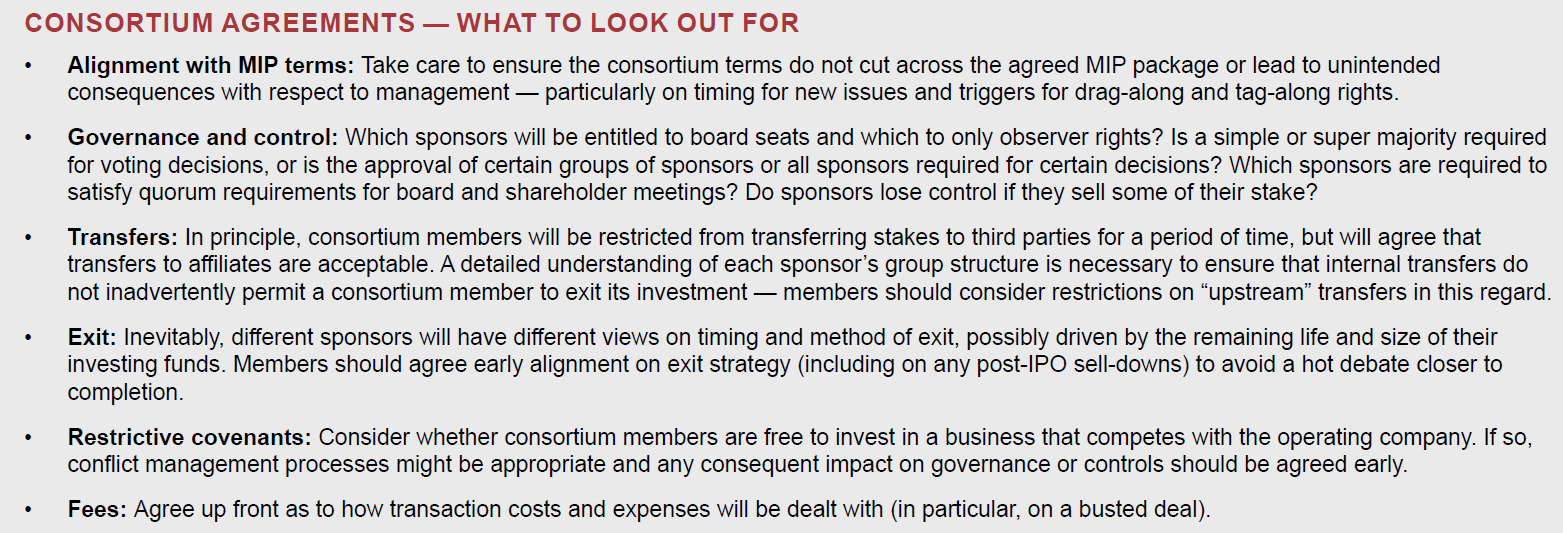

Consortium (or “club”) deals involving PE firms have become a common feature of the deal market throughout 2018, with sponsors teaming up with each other or with strategic partners to buy large-cap assets. To the start of November 2018, 20 consortium transactions worth more than US$1 billion were announced, compared to 17 transactions during 2017. Notable recent deals include a Blackstone-led consortium’s US$17 billion deal to acquire a majority stake in Thomson Reuters’ financial and risk business, and CVC and Blackstone’s US$3 billion deal to buy Paysafe. In our view, political and economic uncertainty in Europe, growing confidence in consortium deals worldwide, and the need to put significant amounts of money to work, could prompt international sponsors to target large public and private European companies previously out of reach. Consortium deals are effective in pursuing these large transactions, however in our view, consortium deals can present challenges.
Vet Consortium Partners for National Security Risks or Risk Regulatory Delays
Sponsor deal teams should be cautious about their choice of partner on a consortium transaction if the acquisition target poses national security issues. Jurisdictions including the US, Australia, the UK, and many European countries have implemented regulatory review processes designed to protect national interests, which may block buyers from certain jurisdictions acquiring assets in a wide range of industries. While Chinese investors have been the focus of national security concerns, rules can capture investors from many jurisdictions. Further, sovereign wealth funds and government affiliated pension funds may also come under scrutiny from regulators. Buyout firms should note that even minority partners in a deal could be reviewed or blocked, placing the transaction at risk and presenting potentially significant financial implications — particularly considering the hefty fees associated with large-cap deals.
Control — Striking the Right Balance
A central issue for sponsors used to maintaining full control of investments will be the allocation of control between consortium members. Veto rights will play an important part in how the business is managed — if one consortium member has too great a protection through veto rights, this imbalance could hamper the strategy of the business. Conversely, too limited protection may limit the ability of a consortium member to effectively contribute to value creation or exit.
The future development or regression of a consortium member’s control rights, for example, on a sell-down, also requires consideration. Allowing a minority consortium member a continued right to block key actions of the business may not be appropriate.
Alignment of Consortium Members Is Important
Further, consortium members should consider the other parties’ investment cycles and seek alignment on the optimal exit timetable for all involved. Teamed-up sponsors must settle other alignment factors early on, including agreed target returns on the investment and approach to management incentivisation.
We expect the trend for consortium deals to continue as PE firms sit on a record US$970 billion of dry powder and look to deploy the capital into sizeable deals, amid a scarcity of assets. However, consortium deals can bring added complexities, and deal teams must plan carefully to maximize deal success.

Click for larger image.